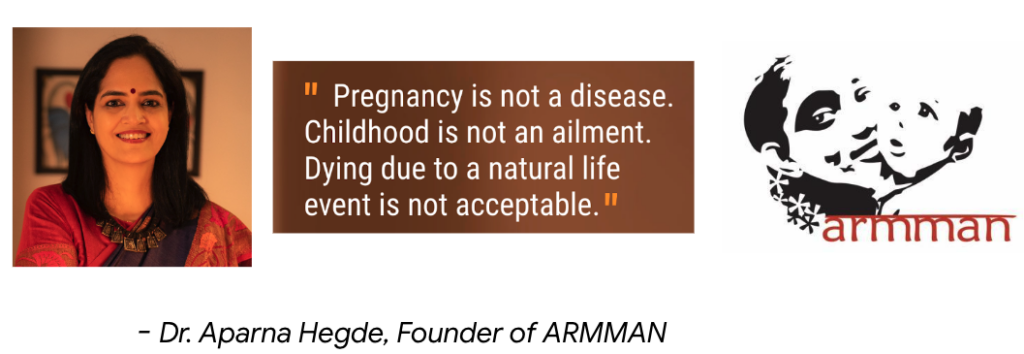Machine Learning to Improve Maternal and Child Healthcare

Machine learning and AI capabilities can be leveraged to predict which mothers are the highest risk of dropping out of health programs. This can allow health workers to preemptively intervene and prevent such dropouts (and subsequent negative health consequences).
Background
The maternal mortality rates in the global south are staggering — for instance, in India, 1 woman dies every 20 minutes in childbirth. What is more disturbing is the fact that most of these deaths are preventable, if only, the expectant mothers have timely access to critical healthcare information.
“ARMMAN”, is an India-based non-profit that aims to alleviate these rates by aiming to bring access to these mothers and has touched the lives of 26 million women so far, across 19 Indian states. ARMMAN leverages the extensive cellphone penetration in the country to send automated, weekly voice messages conveying critical healthcare information.

Unfortunately, such information programs face a key shortcoming: as many as 50% of the enrolled mothers in the program tend to show dwindling patterns of engagement with the program or even drop out completely, leading to negative health consequences. With a limited health worker staff at their disposal, but millions of mothers to cater to, ARMMAN is faced with the conundrum of deciding which mothers to screen for pre-emptive health interventions on a weekly basis.
If only ARMMAN could gaze into a crystal ball and ascertain beforehand, which mothers are likely to drop off and which of them could benefit the most from the health interventions, they would know where to channel their limited health worker resources.
Value Creation from Data-driven AI: Predictive Modeling
With data coming in from millions of mothers that ARMMAN serves and the simultaneous critical need to predict future behavior trend of these mothers, the challenge is ripe for an AI based solution to chime in and deliver value. The solution under the hood deployed at ARMMAN today exploits exactly this idea. ARMMAN uses tools from the AI umbrella — specifically, machine learning and sequential decision-making — developed by a team of researchers from Google, Harvard and other institutions.
There are data available on demographic features such as age, income, education, locality, etc. of enrolled mothers. Furthermore, there is also historical data on the engagement behavior patterns displayed by mothers enrolled in the program in the past.

https://ai.googleblog.com/2022/08/using-ml-to-boost-engagement-with.html
The AI solution leverages these data to learn a ML model capable of predicting these behavioral patterns for new beneficiaries who enroll into the program, purely by looking at their demographic information. Although such a model falls under what is called the “supervised learning” class of methods, the training process, employs tools from a sister subclass called “unsupervised learning”. This is done to iron out a string of other underlying challenges, involving either data imputation or handling missing or unclean data. The behavior pattern predictions dished out by the ML model are then fed into the next layer in the AI pipeline. This layer employs planning algorithms that account for the limited intervention budget available, while also simultaneously considering the predicted behavior patterns. The planning engine then recommends the best set of mothers to pre-emtively intervene on each week, with the goal of maximizing the overall outcomes of the entire beneficiary cohort.
Real-world Results and Takeaways
Real-world results from an actual field evaluation of this algorithm revealed that the AI slashed engagement drops by as much as 30%, compared to the current standard of care. Today, the AI solution is now fully rolled out and operational in assisting ARMMAN with identifying at-risk mothers and helping plan interventions effectively.
“We have seen that when women listen to the information, the health outcomes are phenomenal. We are able to reach out to more and more women each week, bring them back into the fold and save lives because of AI.”
– Dr. Aparna Hegde, Fouder of ARMMAN
References
- “Using ML to Boost Engagement with a Maternal and Child Health Program in India“, Google AI Blog
- “Field Study in Deploying Restless Multi-Armed Bandits: Assisting Non-Profits in Improving Maternal and Child Health”, AAAI Conference on Artificial Intelligence 2022
- “Machine Learning for Maternal Care: CS student helps NGO launch pilot program“, Harvard SEAS



This is a truly inspiring application of AI — thank you for sharing, Aditya! This reminds me somewhat of the mission Ovia Health (original an iPhone app) had at the outset, which was to help women through the fertility journey and identify “high-risk” cases to suggest medical (or other) intervention, thereby improving health outcomes for mother and baby. However, I can’t imagine the challenges ARMMAN faced in implementing a similar mission in populations where access to internet/apps — and the education / literacy required to use them — is not always reliable or consistent. It’s cool to see how a seemingly un-solvable problem (re-engaging the women who have dropped out, prioritizing those who are high risk, with limited human bandwidth) can be unlocked using AI and provide incredible insights to the team, and health outcomes for the women.